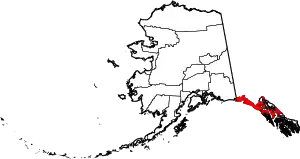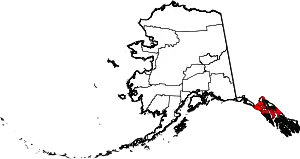Hoonah-Angoon Census Area | |
|---|---|
 Inland Passage to Dicks Arm, view from Cape Spencer Light | |
 Location within the U.S. state of Alaska | |
.svg.png.webp) Alaska's location within the U.S. | |
| Coordinates: 58°08′00″N 135°09′00″W / 58.133333333333°N 135.15°W | |
| Country | |
| State | |
| Established | 2007[1] |
| Named for | Hoonah and Angoon |
| Largest city | Hoonah |
| Area | |
| • Total | 10,914 sq mi (28,270 km2) |
| • Land | 7,525 sq mi (19,490 km2) |
| • Water | 3,389 sq mi (8,780 km2) 31.1% |
| Population (2020) | |
| • Total | 2,287 |
| • Density | 0.21/sq mi (0.081/km2) |
| Time zone | UTC−9 (Alaska) |
| • Summer (DST) | UTC−8 (ADT) |
| Congressional district | At-large |
Hoonah–Angoon Census Area is a census area located in the U.S. state of Alaska. As of the 2020 census, the population was 2,365,[2] up from 2,150 in 2010.[3] It is part of the unorganized borough and therefore has no borough seat. Its largest community is the city of Hoonah.
History

The census area was significantly larger in the 1990 census, at which time it was the Skagway–Yakutat–Angoon Census Area. After Yakutat was incorporated as a consolidated-city borough on September 22, 1992, it was renamed Skagway–Hoonah–Angoon Census Area;[4] When Skagway followed suit on June 20, 2007,[5][6] the census area assumed its current name.
Geography
According to the U.S. Census Bureau, the census area has a total area of 10,914 square miles (28,270 km2), of which 7,525 square miles (19,490 km2) is land and 3,389 square miles (8,780 km2) (31.1%) is water.[7] A map showing its current boundaries is shown here:[8]
Adjacent boroughs and census areas
- Yakutat City and Borough, Alaska – northwest
- Haines Borough, Alaska – northeast
- Juneau City and Borough, Alaska – northeast
- Petersburg Borough, Alaska – southeast
- Sitka City and Borough, Alaska – southwest
- Stikine Region, British Columbia – northwest, east
- Kitimat-Stikine Regional District, British Columbia – southeast
National protected areas
- Glacier Bay National Park (part)
- Glacier Bay Wilderness (part)
- Tongass National Forest (part)
Demographics

- Note: Demographic data below is for the former "Skagway–Hoonah–Angoon" Census Area, which still includes Skagway Borough.
| Census | Pop. | Note | %± |
|---|---|---|---|
| 2010 | 2,150 | — | |
| 2020 | 2,365 | 10.0% | |
| U.S. Decennial Census[9] 2010–2020[3] | |||
As of the census[10] of 2000, there were 3,436 people, 1,369 households, and 866 families residing in the census area. The population density was 0.30 people per square mile (0.12 people/km2). There are 2,108 housing units. The racial makeup of the census area was 58.15% White, 0.15% Black or African American, 35.01% Native American, 0.38% Asian, 0.15% Pacific Islander, 0.96% from other races, and 5.21% from two or more races. 2.82% of the population were Hispanic or Latino of any race. 3.95% reported speaking Tlingit at home, while 1.83% speak Spanish Archived September 30, 2007, at the Wayback Machine.
There were 1,369 households, out of which 30.80% had children under the age of 18 living with them, 49.30% were married couples living together, 8.40% had a female householder with no husband present, and 36.70% were non-families. 30.10% of all households were made up of individuals, and 5.60% had someone living alone who was 65 years of age or older. The average household size was 2.50 and the average family size was 3.14.
In the census area, the population was spread out, with 26.80% under the age of 18, 7.10% from 18 to 24, 29.50% from 25 to 44, 29.30% from 45 to 64, and 7.30% who were 65 years of age or older. The median age was 38 years. For every 100 females, there were 116.40 males. For every 100 females age 18 and over, there were 120.70 males.
Politics
One of the most Democratic areas in Alaska, the Hoonah-Angoon Census Area has only voted for a Republican for president once (during the 2000 election).
| Year | Republican | Democratic | Third party | |||
|---|---|---|---|---|---|---|
| No. | % | No. | % | No. | % | |
| 2020 | 577 | 25.08% | 1,645 | 71.49% | 79 | 3.43% |
| 2016 | 452 | 31.52% | 753 | 52.51% | 229 | 15.97% |
| 2012 | 453 | 36.10% | 743 | 59.20% | 59 | 4.70% |
| 2008 | 585 | 44.69% | 672 | 51.34% | 52 | 3.97% |
| 2004 | 463 | 45.80% | 494 | 48.86% | 54 | 5.34% |
| 2000 | 594 | 44.16% | 539 | 40.07% | 212 | 15.76% |
| 1996 | 292 | 31.16% | 432 | 46.10% | 213 | 22.73% |
| 1992 | 260 | 28.17% | 407 | 44.10% | 256 | 27.74% |
| 1988 | 428 | 41.96% | 532 | 52.16% | 60 | 5.88% |
| 1984 | 519 | 46.88% | 550 | 49.68% | 38 | 3.43% |
| 1980 | 288 | 30.09% | 517 | 54.02% | 152 | 15.88% |
| 1976 | 304 | 32.90% | 563 | 60.93% | 57 | 6.17% |
| 1972 | 300 | 45.25% | 346 | 52.19% | 17 | 2.56% |
| 1968 | 272 | 43.38% | 322 | 51.36% | 33 | 5.26% |
| 1964 | 90 | 12.95% | 605 | 87.05% | 0 | 0.00% |
| 1960 | 301 | 46.52% | 346 | 53.48% | 0 | 0.00% |
Communities
Cities
Census-designated places
Other unincorporated places
See also
References
- ↑ The census area acquired its current name in 2007, after Skagway Borough was created.
- ↑ "2020 Census Data - Cities and Census Designated Places" (Web). State of Alaska, Department of Labor and Workforce Development. Retrieved October 31, 2021.
- 1 2 "State & County QuickFacts". United States Census Bureau. Archived from the original on July 31, 2014. Retrieved May 18, 2014.
- ↑ Population of Alaska by Labor Market Region, Borough and Census Area, 1990–1999 Archived May 1, 2009, at the Wayback Machine, Alaska Department of Labor and Workforce Development. Accessed January 20, 2009.
- ↑ "INCITS 31:200x (Formerly FIPS 6-4) CHANGE NOTICES". www.census.gov. Archived from the original on March 25, 2010. Retrieved May 22, 2022.
- ↑ June 5, 2008 election, Skaguay News, summer edition, 2008. Page 17.
- ↑ "US Gazetteer files: 2010, 2000, and 1990". United States Census Bureau. February 12, 2011. Retrieved April 23, 2011.
- ↑ Map: Hoonah-Angoon Census Area Archived August 11, 2009, at the Wayback Machine Alaska Department of Labor
- ↑ "U.S. Decennial Census". United States Census Bureau. Retrieved November 21, 2021.
- ↑ "U.S. Census website". United States Census Bureau. Retrieved May 14, 2011.
- ↑ Elections, RRH (February 2, 2018). "RRH Elections". rrhelections.com. Retrieved January 12, 2020.
